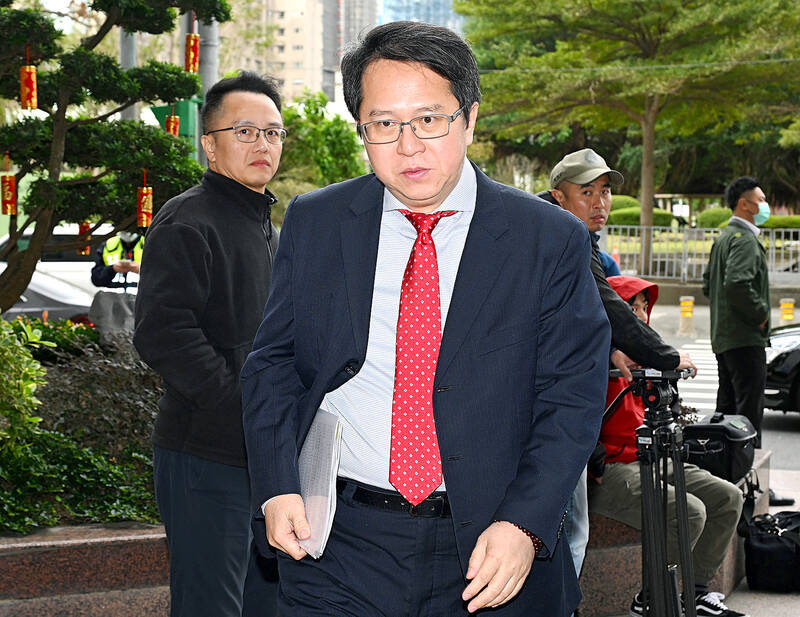A task force should be established in line with the three presidential committees formed last year to manage the Taiwan-US relationship, Democratic Progressive Party Legislator Chiu Chih-wei (邱志偉) said yesterday.
Although concerns have been raised over Taiwan-US ties given conflicting political causes, Washington does not seem to be changing its stance on China, he said.
However, the government should get rid of old mindsets, as policies such as “values diplomacy” or “democracy diplomacy” would no longer be enough to sustain ties with a White House led by US President Donald Trump, Chiu said, adding that Taiwan must demonstrate its indispensability to the US.

Photo: Liao Chen-huei, Taipei Times
The New York Times on Thursday cited US government insiders as saying that Taiwanese officials’ efforts to build bridges into Trump’s inner circle during trips to Washington have yielded little so far.
Chiu said the administration should set up a task force dedicated to communications with Washington, such as the “Mingteh Project,” or “Ming-teh-Gruppe,” though which Germany sent off-duty military officers to advise Chiang Kai-shek (蔣介石) in the 1960s.
Regular, normalized communications between the two governments must be established via a task force to build stable relations and promptly solve issues, he said.
The task force should include officials from the ministries of national security, national defense and finance, and diplomatic agencies, to promote prompt communication with the Trump administration, Chiu added.
While heads of state from major Asian countries, such as Japan and India, have visited the US since Trump returned to office, Taiwan’s president and vice president might not follow suit due to the nation’s tricky diplomatic situation, he said.
However, a special presidential envoy should be sent to visit the US as soon as possible, Chiu said, adding that someone with an industrial background and who is familiar with US politics would be the best choice.
Regular meetings between the government, industry and academia, and national affairs conferences on trade and economics should also be held to discuss difficult issues in the Taiwan-US relationship, as well the impact of tariff policies and industrial development on the semiconductor sector, he said.
In other news, Chinese Nationalist Party (KMT) Legislator Lee Yen-hsiu (李彥秀) said opposition parties would support the procurement of necessary arms, but special budgets would not be allocated without considering the national fiscal situation.
Lee made the comment in response to President William Lai’s (賴清德) call to raise defense spending to at least 3 percent of GDP.
Given that Trump during his campaign said he expected Taiwan to have a national defense budget of as high as 10 percent of GDP, Lai’s 3 percent proposal might be far off Trump’s goal, she said.
The government should also proactively ask the US government to complete delayed deliveries of anti-tank missiles, glide bombs and F-16 aircraft, Lee added.
KMT Legislator Hsu Yu-chen (許宇甄) said that a special budget of NT$160 billion (US$4.88 billion) must be drawn up this year to meet Lai’s goal.
Lai might get that budget from the NT$528.3 billion tax surplus, but people’s livelihoods should come before arms procurements, she added.
Meanwhile, Taiwan People’s Party caucus director Vicky Chen (陳智菡) said her party supports a balanced split of the military budget between personnel expenses, operational costs and military investments, with the aim of building modernized armed forces and achieving autonomous national defense.
Additional reporting by Su Yung-yao

DEFENSE: The National Security Bureau promised to expand communication and intelligence cooperation with global partners and enhance its strategic analytical skills China has not only increased military exercises and “gray zone” tactics against Taiwan this year, but also continues to recruit military personnel for espionage, the National Security Bureau (NSB) said yesterday in a report to the Legislative Yuan. The bureau submitted the report ahead of NSB Director-General Tsai Ming-yen’s (蔡明彥) appearance before the Foreign and National Defense Committee today. Last year, the Chinese People’s Liberation Army (PLA) conducted “Joint Sword-2024A and B” military exercises targeting Taiwan and carried out 40 combat readiness patrols, the bureau said. In addition, Chinese military aircraft entered Taiwan’s airspace 3,070 times last year, up about

Taiwan is stepping up plans to create self-sufficient supply chains for combat drones and increase foreign orders from the US to counter China’s numerical superiority, a defense official said on Saturday. Commenting on condition of anonymity, the official said the nation’s armed forces are in agreement with US Admiral Samuel Paparo’s assessment that Taiwan’s military must be prepared to turn the nation’s waters into a “hellscape” for the Chinese People’s Liberation Army (PLA). Paparo, the commander of the US Indo-Pacific Command, reiterated the concept during a Congressional hearing in Washington on Wednesday. He first coined the term in a security conference last

A magnitude 4.3 earthquake struck eastern Taiwan's Hualien County at 8:31am today, according to the Central Weather Administration (CWA). The epicenter of the temblor was located in Hualien County, about 70.3 kilometers south southwest of Hualien County Hall, at a depth of 23.2km, according to the administration. There were no immediate reports of damage resulting from the quake. The earthquake's intensity, which gauges the actual effect of a temblor, was highest in Taitung County, where it measured 3 on Taiwan's 7-tier intensity scale. The quake also measured an intensity of 2 in Hualien and Nantou counties, the CWA said.

The Overseas Community Affairs Council (OCAC) yesterday announced a fundraising campaign to support survivors of the magnitude 7.7 earthquake that struck Myanmar on March 28, with two prayer events scheduled in Taipei and Taichung later this week. “While initial rescue operations have concluded [in Myanmar], many survivors are now facing increasingly difficult living conditions,” OCAC Minister Hsu Chia-ching (徐佳青) told a news conference in Taipei. The fundraising campaign, which runs through May 31, is focused on supporting the reconstruction of damaged overseas compatriot schools, assisting students from Myanmar in Taiwan, and providing essential items, such as drinking water, food and medical supplies,